
Customers gather outside a Sudanese-run barbershop in Beirut. May 6, 2023. (Credit: João Sousa/L’Orient Today)
BEIRUT — “All I know about the war is what I’m seeing on TikTok.”
It’s Friday afternoon, and 49-year-old Moussa is on his phone scrolling through video snippets of the fighting at home in Sudan. He also checks WhatsApp for any new messages from loved ones. Nothing.
The screen suddenly lights up, and it’s a friend in Sudan calling via WhatsApp. But as soon as Moussa answers, the connection cuts off, and the rare phone call from home is over.
Moussa has been in Lebanon for 13 years, where he works as a project supervisor for an international company. In that time, he married an Ethiopian woman, Abyo, and had a son, Ismael, who speaks Lebanese Arabic and attends a Lebanese school.
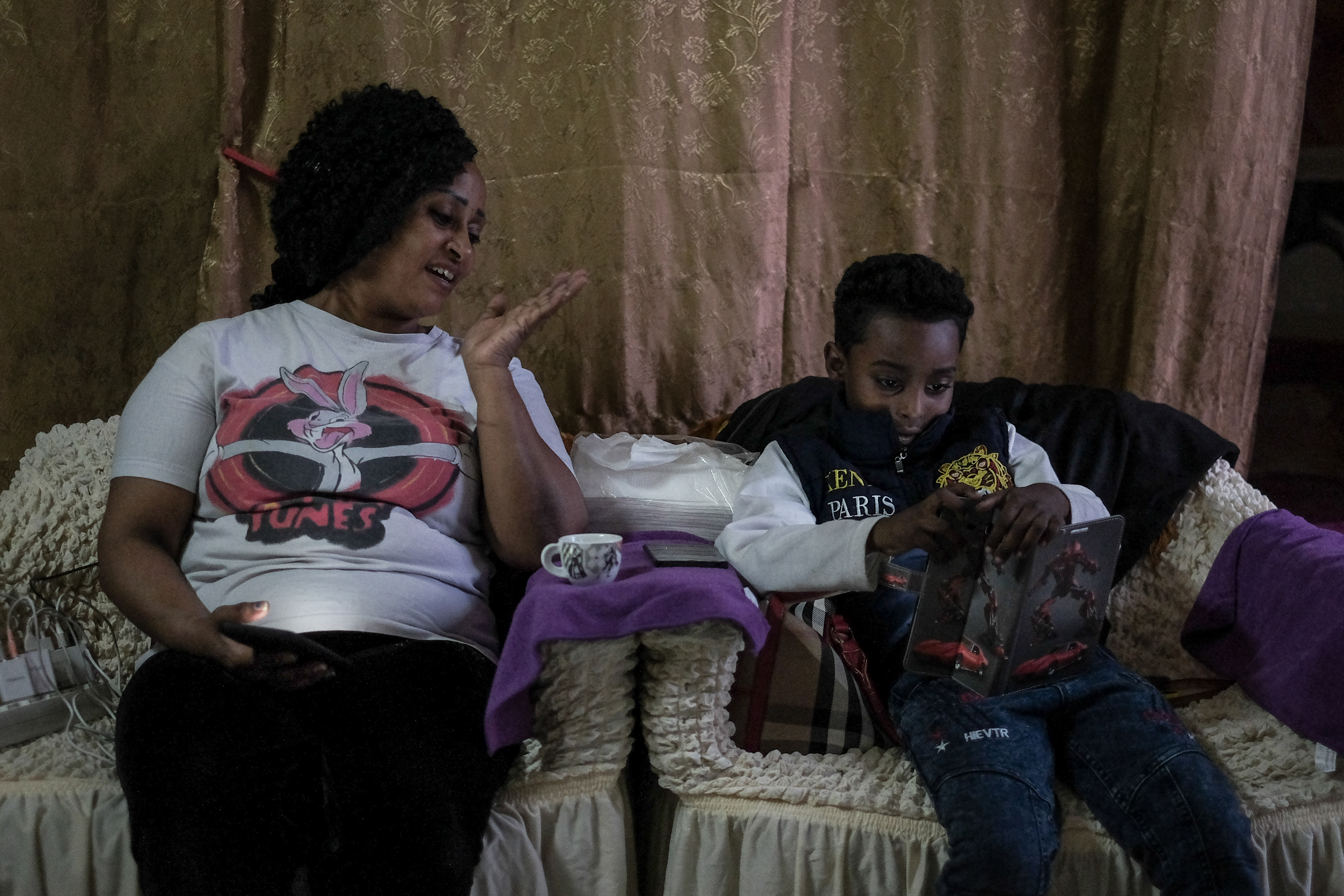 Moussa’s wife, Abyo, and son, Ismael, in their living room in Beirut. May 5, 2023. (Credit: João Sousa/L’Orient Today)
Moussa’s wife, Abyo, and son, Ismael, in their living room in Beirut. May 5, 2023. (Credit: João Sousa/L’Orient Today)
He’s also managed to visit Sudan about once every year to see his family, who are spread across the capital city, Khartoum, and their home village not too far away.
Those visits are now on hold since a deadly war broke out in Sudan last month between the army and paramilitary Rapid Support Forces (RSF). Already, more than 100,000 people have been displaced to neighboring countries, and 700,000 within Sudan, according to the UN.
The fighting has so far killed more than 700 people and injured thousands.
Intermittent internet cutoffs are preventing people in Sudan from reaching their loved ones abroad, according to Lebanese freedom-of-information NGO SMEX.
Moussa’s other two sons, both in their 20s and living in Sudan, still don’t have phone connection or internet and haven’t responded to him in days. His sister and mother are also unreachable in Khartoum, where they live.
He says the news on TikTok isn’t updated quickly enough for him to guess whether they might be safe today.
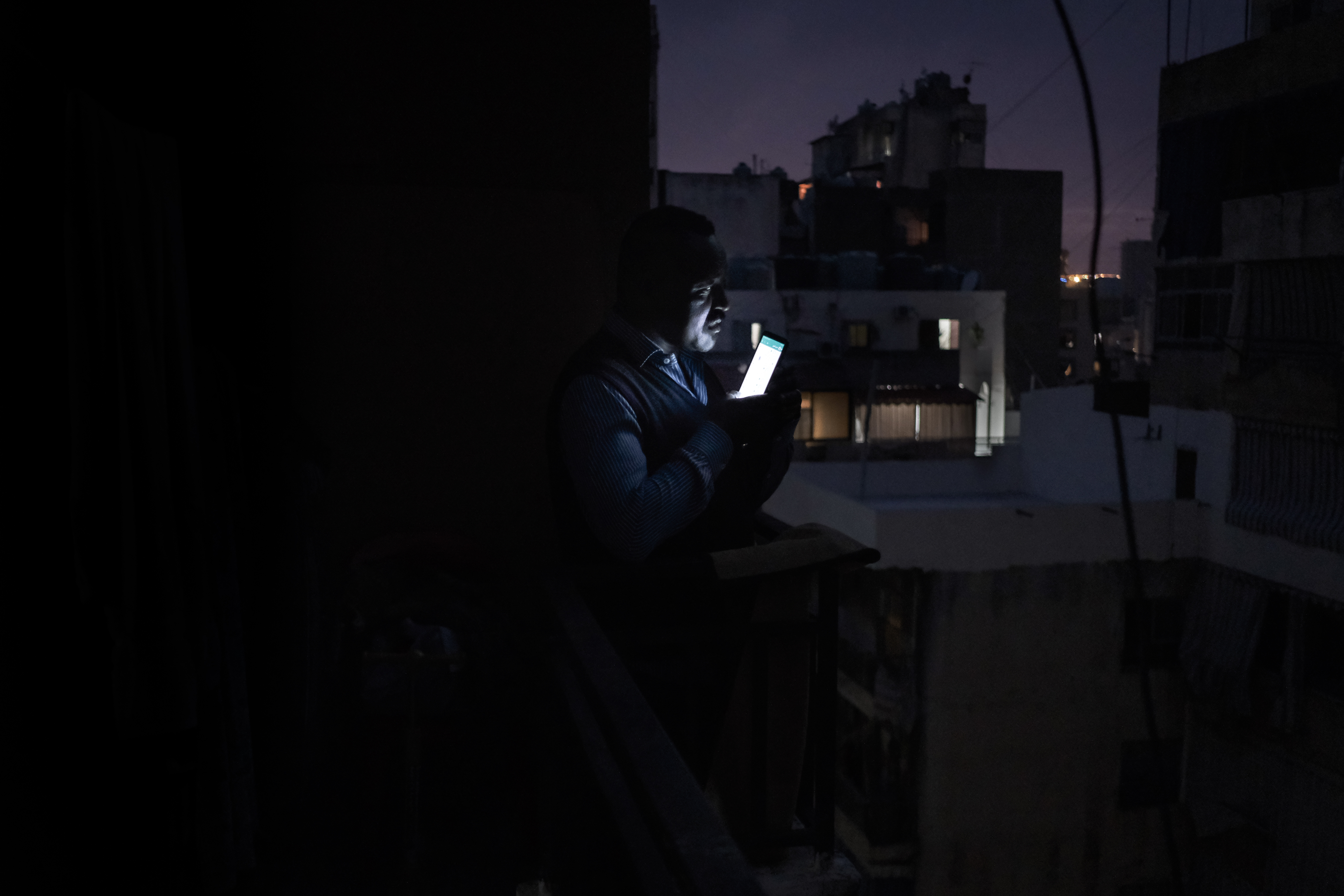 Moussa, a project supervisor, tries sending WhatsApp voice notes to his loved ones in Sudan, whom he hasn’t heard from in days due to internet outages. May 5, 2023. (Credit: João Sousa/L’Orient Today)
Moussa, a project supervisor, tries sending WhatsApp voice notes to his loved ones in Sudan, whom he hasn’t heard from in days due to internet outages. May 5, 2023. (Credit: João Sousa/L’Orient Today)
More than 11,500 Sudanese citizens live across Lebanon, the majority of them in Beirut, according to UN data collected last summer.
Many are here via Lebanon’s kafala (“sponsor”) work visa system, which often leaves foreign workers at risk of abuse, Kareem Nofal, a communications specialist at the Anti-Racism Movement (ARM), tells L’Orient Today. There’s also the added “social stigma” Sudanese workers face due to anti-Black racism, Nofal says.
“Like many migrant workers, Sudanese workers also face the risk of arrests or deportation on the basis of their residency status, which is entirely linked to and controlled by the sponsor.”
Most of the workers are men, though there are a couple hundred women, too. They came here to send money back home, save up for marriage and, if all goes well, start a family like Moussa’s.
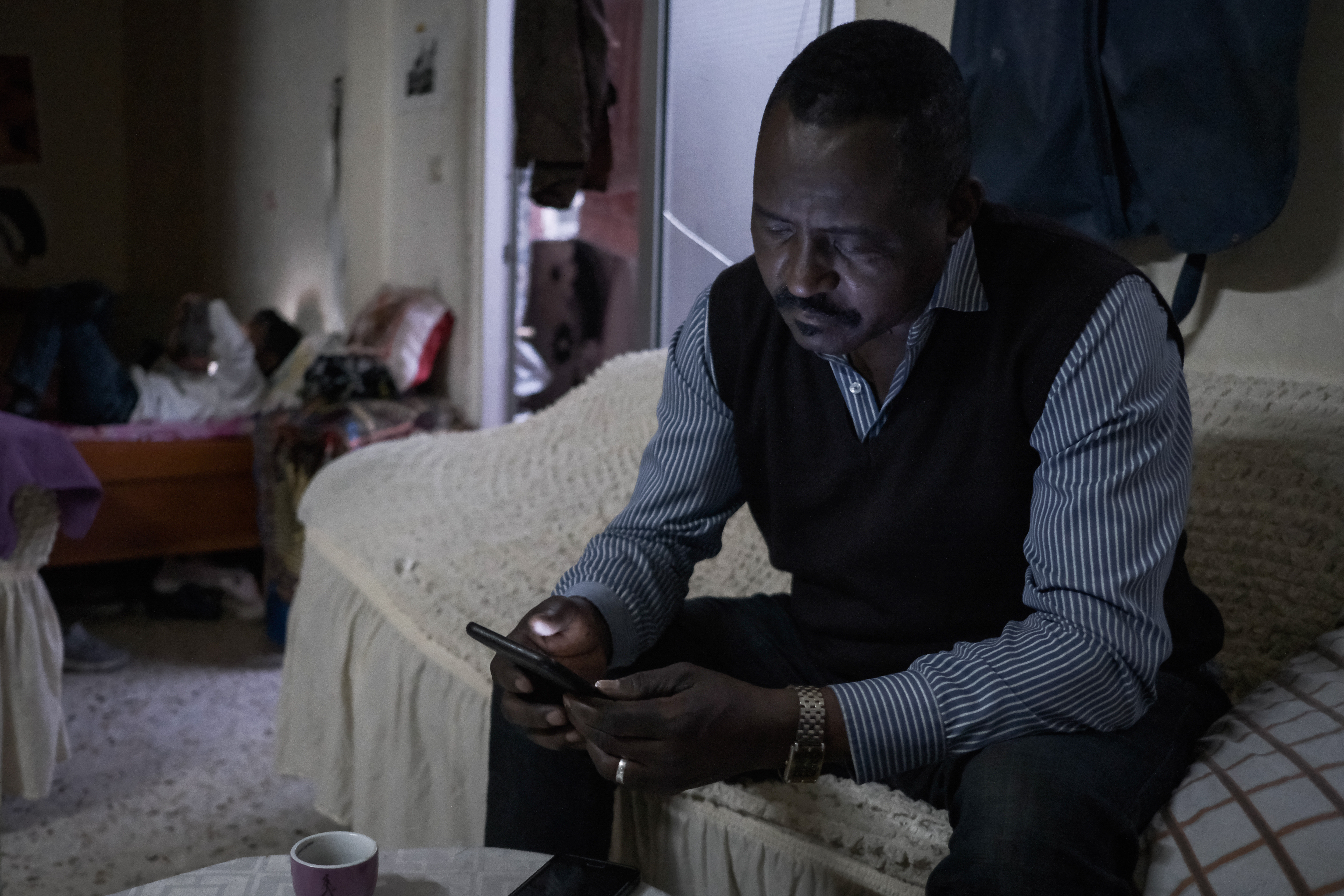 Moussa, a project supervisor, scrolls through unreceived messages to his loved ones in Sudan, whom he hasn’t heard from in days due to internet outages. May 5, 2023. (Credit: João Sousa/L’Orient Today)
Moussa, a project supervisor, scrolls through unreceived messages to his loved ones in Sudan, whom he hasn’t heard from in days due to internet outages. May 5, 2023. (Credit: João Sousa/L’Orient Today)
‘What can I do?’
Moussa knows where most of the neighborhood’s young Sudanese men hang out: a hole-in-the-wall cafe-restaurant a few minutes down the road which, by Friday night, is packed with local guys. He walks downstairs and over to the place — known simply as the “Sudanese restaurant” — to make his rounds and say hello.
It’s on the ground floor of a run-down concrete apartment block. The men are here for shisha, TV, bouncy Sudanese pop music and card games after a long week. A tiny kitchen in the back manages to serve dozens of customers.
Some customers are also here for the news, via a TV on a giant Sudanese-flag-adorned wall. For about an hour nonstop, it sticks solely to a Saudi channel’s news reports on the fighting in Sudan: grainy video clips of airstrikes, footage of people using generators and tangled extension cords to charge their cell phones near the frontlines.
Moussa evaporates somewhere into the crowded restaurant.
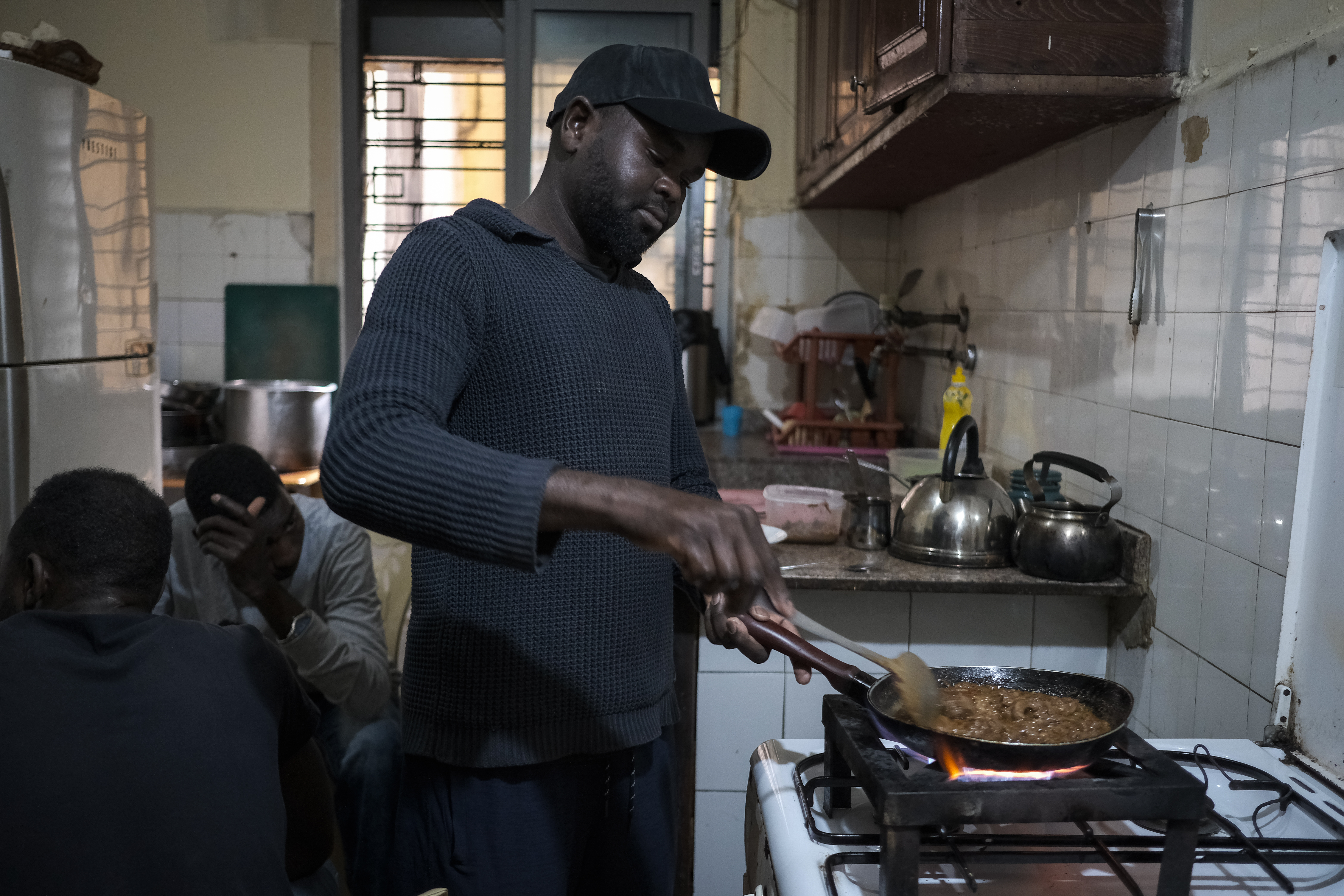 A worker cooks food for members at the Sudanese Club in Beirut. May 7, 2023. (Credit: João Sousa/L’Orient Today)
A worker cooks food for members at the Sudanese Club in Beirut. May 7, 2023. (Credit: João Sousa/L’Orient Today)
Ibrahim, one customer, stays glued to the news broadcast as he shares a shisha with his friends.
Like Moussa, he hasn’t been able to reach his family back in Sudan in days.
“See?” He grabs his cell phone and dials a phone number labeled “my sister” in Arabic. It rings for a moment but doesn’t go through. There’s no reception on her end.
He and his friends still aren’t quite sure what to make of the war footage on the TV. They say the conflict, which broke out on April 15, took them by surprise. They’re not yet used to the idea of their home being at war.
“All day, we’re watching what’s going on in Sudan,” says Ahmad, another customer, between drags off the shisha he’s sharing with Ibrahim. He sits on a plastic chair in front of the TV.
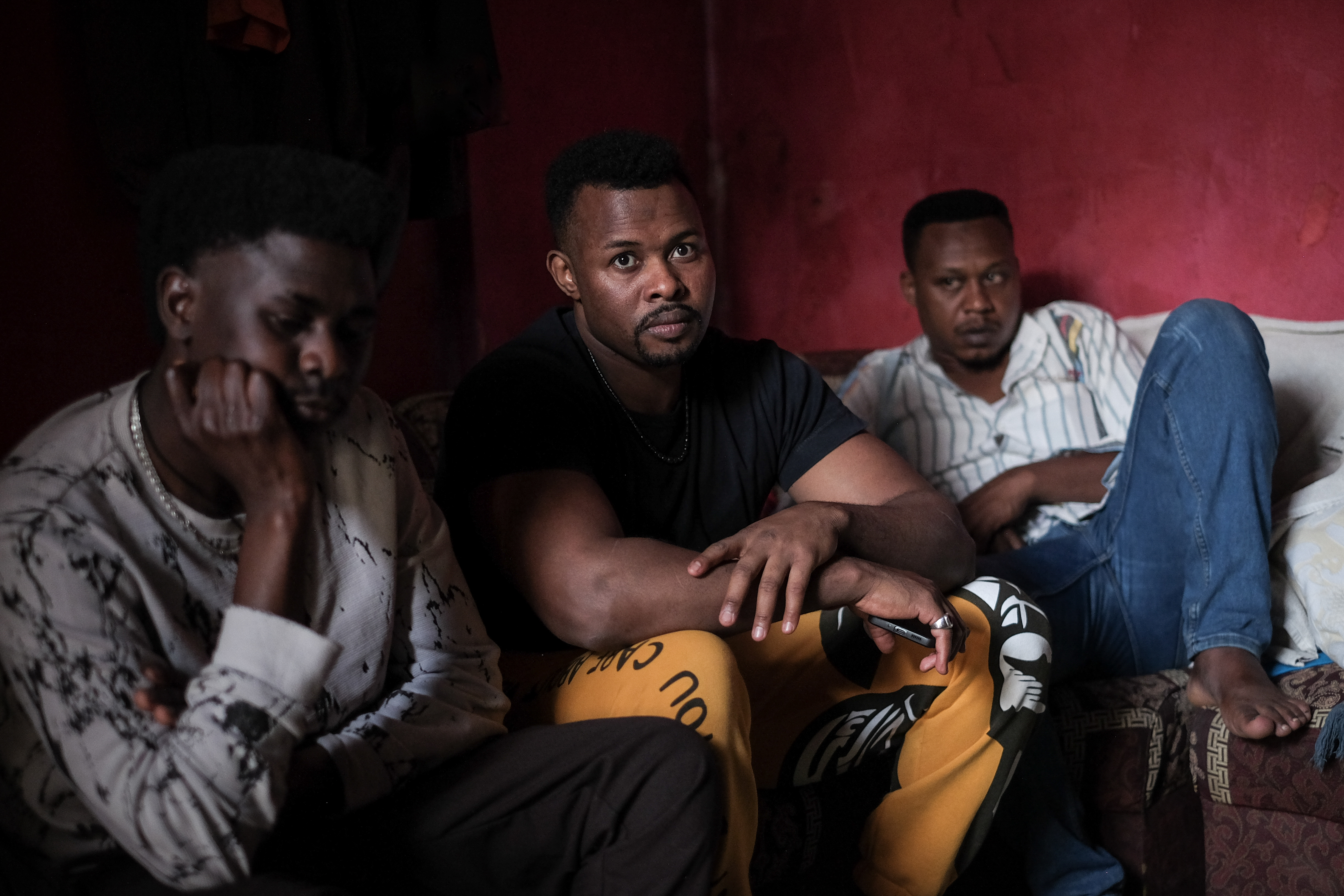 Three young workers gather in Hadi’s (right) one-room apartment in Beirut. They haven’t heard from their loved ones in Sudan in days due to internet outages. May 6, 2023. (Credit: João Sousa/L’Orient Today)
Three young workers gather in Hadi’s (right) one-room apartment in Beirut. They haven’t heard from their loved ones in Sudan in days due to internet outages. May 6, 2023. (Credit: João Sousa/L’Orient Today)
Ahmad says he’s been working in Lebanon for over a decade, since he was a teenager. Before the war broke out, he used to talk to his family once a week by phone. But now that the internet is cut off in his hometown, he hasn’t been able to check on them. Last he knew, they were still at home.
“What can I do? There’s no net there,” Ahmad says. “I miss them.”
Do they hope the fighting might end soon? After all, there have been efforts toward a truce in recent days. “That’s what social media says, but this is what we’re seeing every day on TV,” says Ahmad, pointing at a broadcast of the fighting. “All day we’re watching what’s going on in Sudan.”
“Do you see that?” asks Adam, who watches the TV next to Ahmad. He says he heard about a friend back in Sudan who was recently wounded in the fighting, hit by gunfire. Still, he doesn’t have news of his family.
Adam points to the TV. “My family is there.”
‘All the Sudanese in Lebanon are now stuck’
 A poster outside a Sudanese-run barbershop in Beirut. May 6, 2023. (Credit: João Sousa/L’Orient Today)The following afternoon, the Sudanese restaurant is mostly empty as it’s too early in the day.
A poster outside a Sudanese-run barbershop in Beirut. May 6, 2023. (Credit: João Sousa/L’Orient Today)The following afternoon, the Sudanese restaurant is mostly empty as it’s too early in the day.
But across an outer courtyard is a barbershop with buzzy Sudanese radio tunes and a few rows of sneakers and a Bob Marley T-shirt for sale. A half dozen guys line up to wait their turn at a haircut, some of them using motorbikes parked outside as chairs.
For now, they’re mostly chatting and joking around.
One young worker named Bichara says the political tensions — between army supporters and RSF supporters — that pushed Sudan into war haven’t managed to break out between the Sudanese workers here in Lebanon.
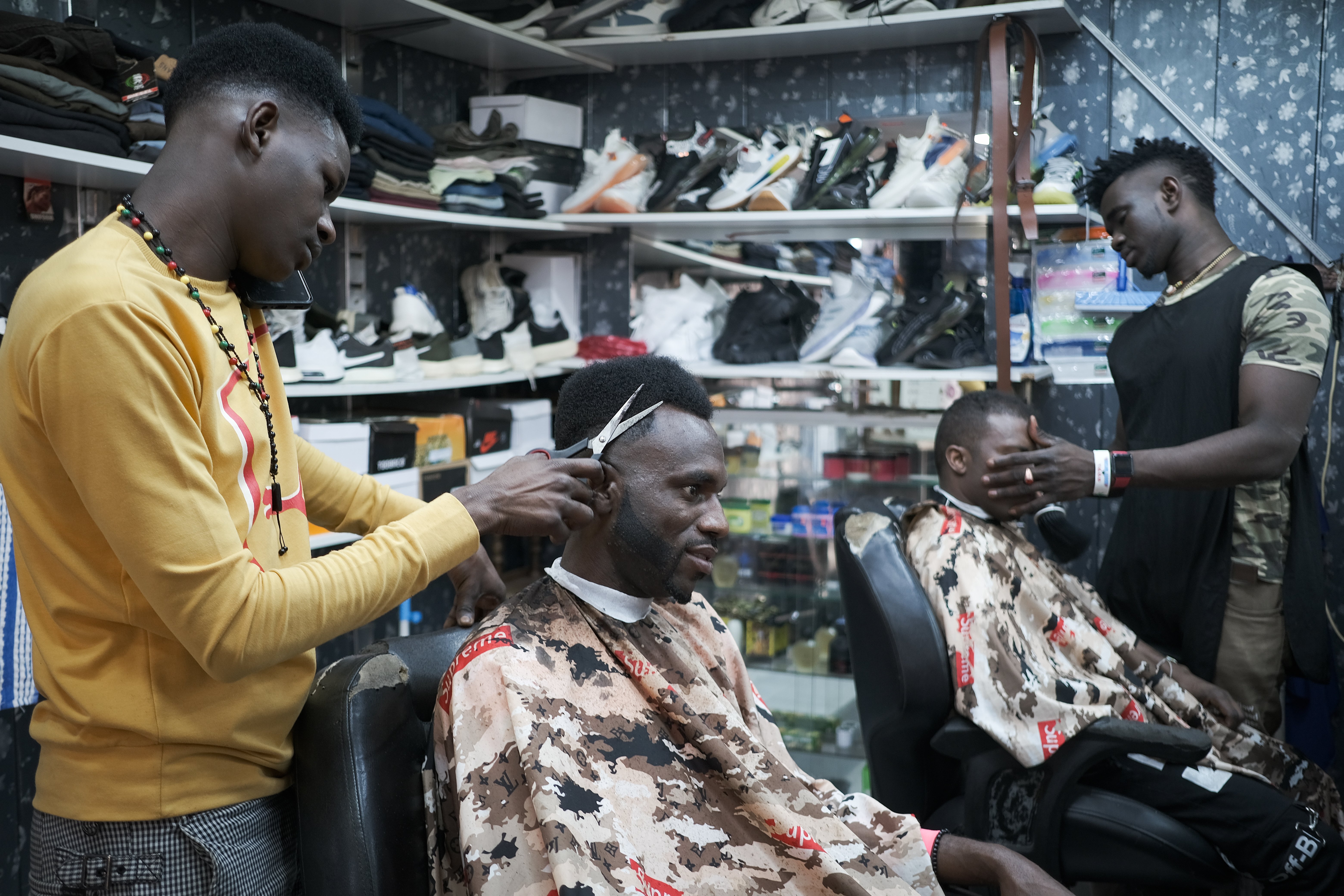 Customers get haircuts inside a Sudanese-run barbershop in Beirut. May 6, 2023. (Credit: João Sousa/L’Orient Today)
Customers get haircuts inside a Sudanese-run barbershop in Beirut. May 6, 2023. (Credit: João Sousa/L’Orient Today)
“Here there are no problems between us,” he says, waiting for a trim on a sofa near the barbers’ chairs. He says workers are simply worrying about their loved ones.
They also feel trapped in place, unable to fully live out their dreams in Lebanon and unable to return to their home country in the midst of bloodshed.
“All the Sudanese in Lebanon are now stuck: they can’t go back and can’t live here.”
Another customer, Abdulrahman, says he and other workers looked into sending money back home to Sudan to help out relatives caught on the frontlines. With a monthly salary of $200 in Beirut, Abdulrahman says he had hoped to send a one-time payment of $300 home to his family simply so they could keep buying daily necessities like food and water.
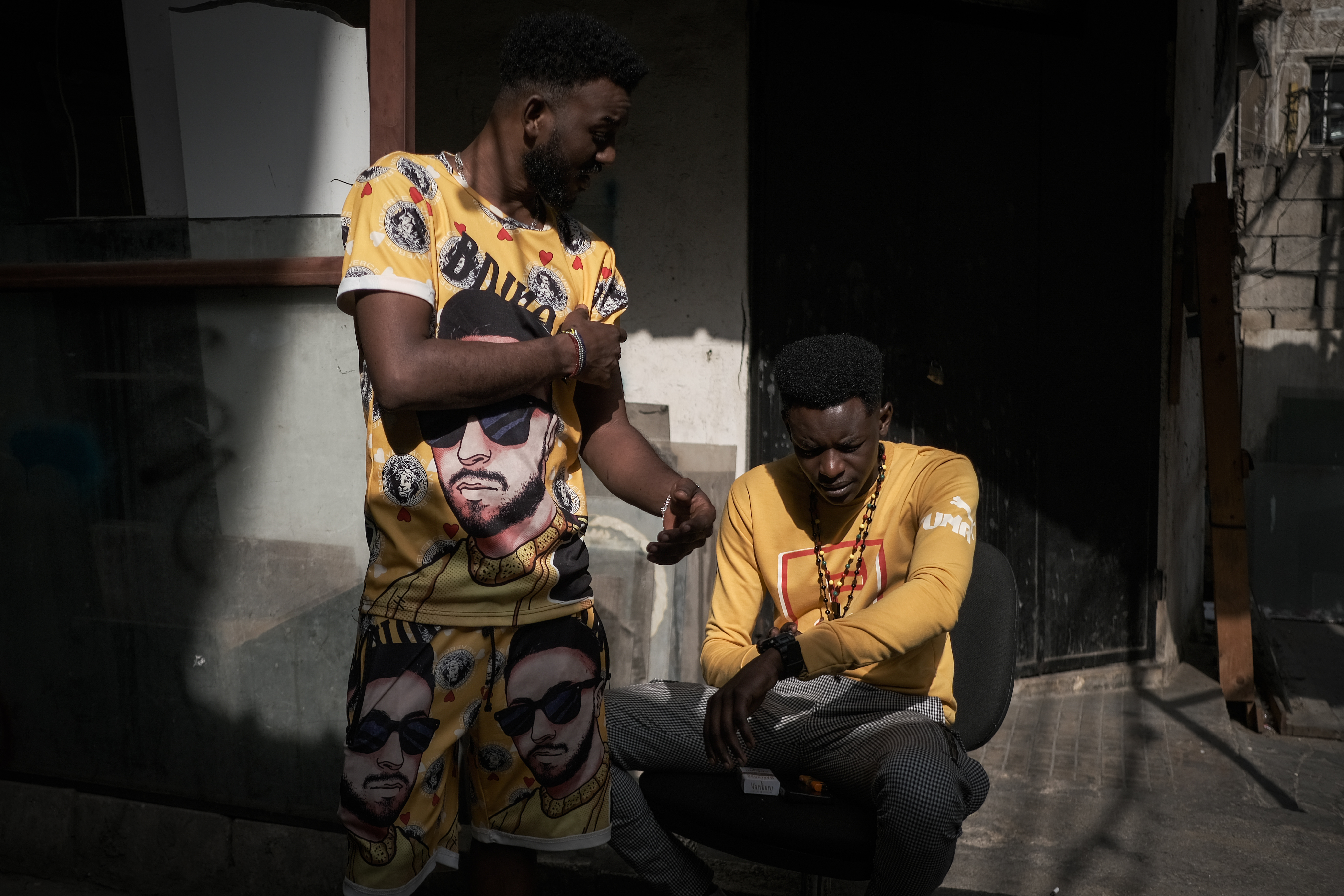 Two young Sudanese men hang out at a Sudanese-run barbershop in Beirut. May 6, 2023. (Credit: João Sousa/L’Orient Today)
Two young Sudanese men hang out at a Sudanese-run barbershop in Beirut. May 6, 2023. (Credit: João Sousa/L’Orient Today)
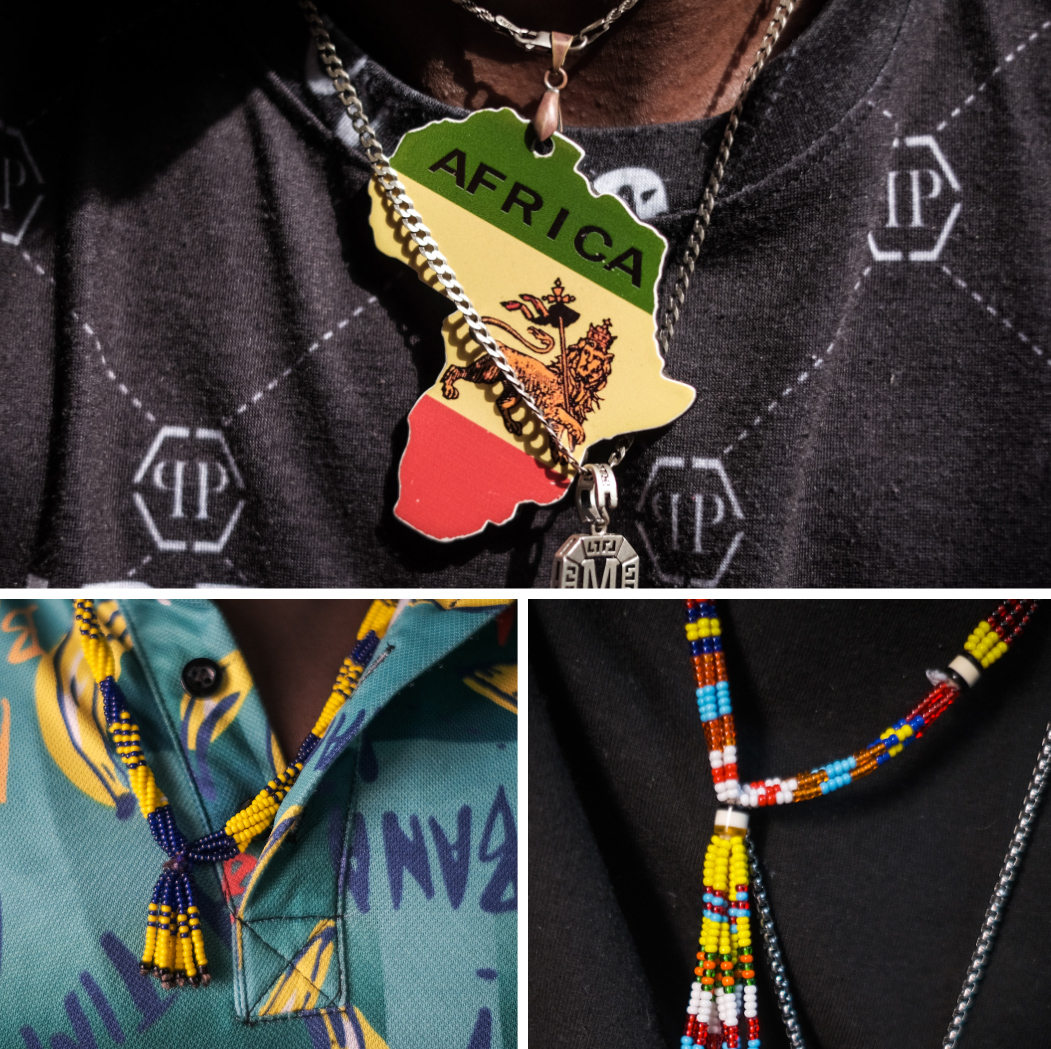 Sudanese workers in Beirut wearing necklaces they brought with them from Sudan. May 6, 2023. (Credit: João Sousa/L’Orient Today)
Sudanese workers in Beirut wearing necklaces they brought with them from Sudan. May 6, 2023. (Credit: João Sousa/L’Orient Today)
But so far, that plan hasn’t panned out. He managed to call a friend in his hometown who said the fighting forced local money transfer offices to close.
And when Abdulrahman called a money transfer office in Khartoum as a last resort, the call simply didn’t go through.
He says other guys in his building have also tried connecting with money transfer offices in Sudan, but to no avail.
From Lebanon, there’s little else they can do to help. “We can’t even check on them,” says Bichara.
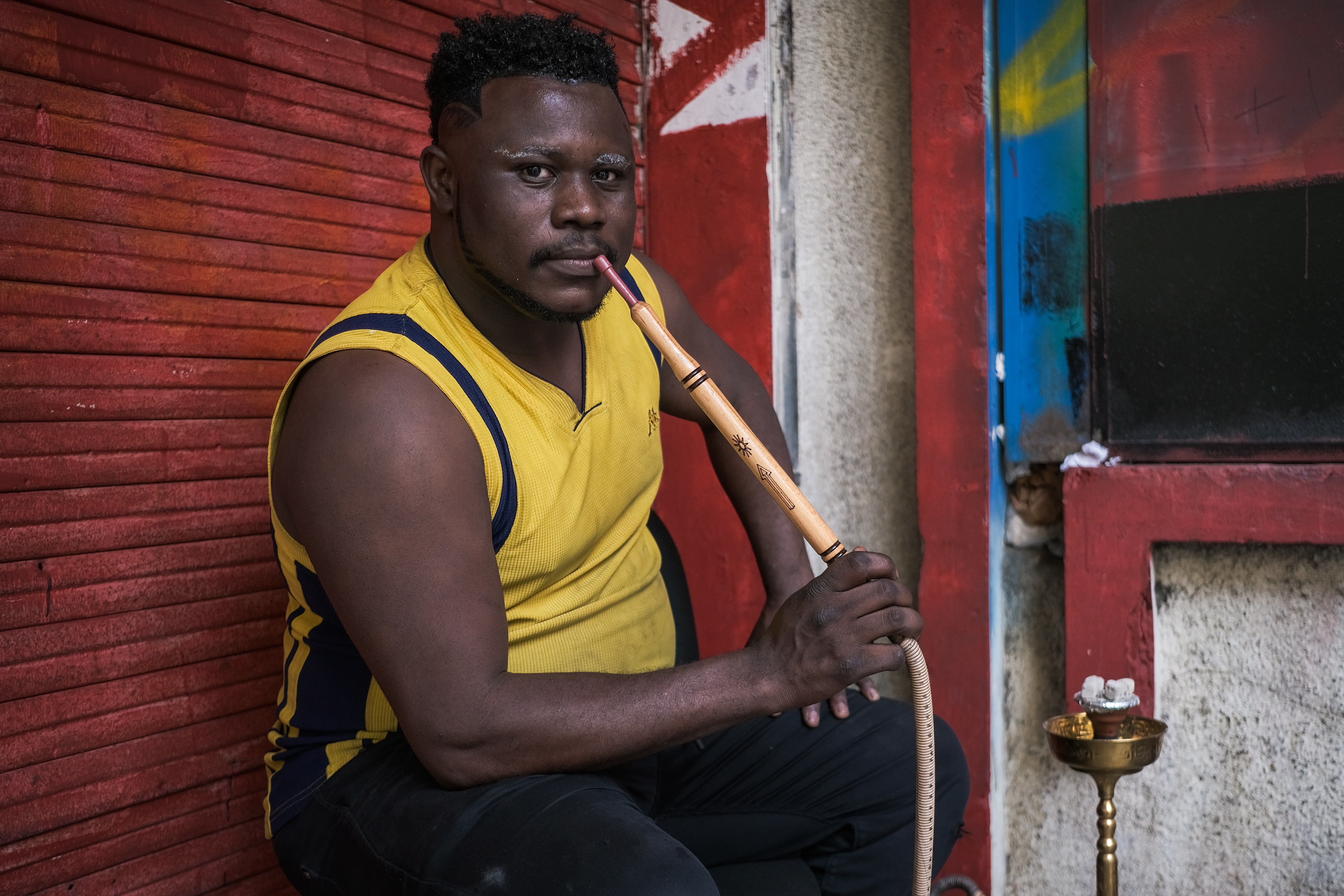 A young Sudanese man hangs out at a Sudanese-run barbershop in Beirut. May 7, 2023. (Credit: João Sousa/L’Orient Today)
A young Sudanese man hangs out at a Sudanese-run barbershop in Beirut. May 7, 2023. (Credit: João Sousa/L’Orient Today)
‘Too many azaas to count’
Hidden on a leafy sidestreet of Hamra is the Sudanese Club, founded in 1967. That was a time when easier travel between Khartoum and Beirut meant Sudanese cooks traveled to Lebanon to work as private household chefs, explains club administration director Ibrahim Said, who works in Beirut as a theater usher.
Today the Sudanese Club’s members include electricians, chauffeurs and manual laborers.
According to them, the club is still the weekly social highlight of Lebanon’s Sudanese workers, who gather on Sunday afternoons for card games and chit-chat.
A few older members who’ve been in Lebanon since the 1990s sit in the salon wearing stylish wool suit jackets. Younger guys park their motorbikes outside and file in through a tree-shaded balcony.
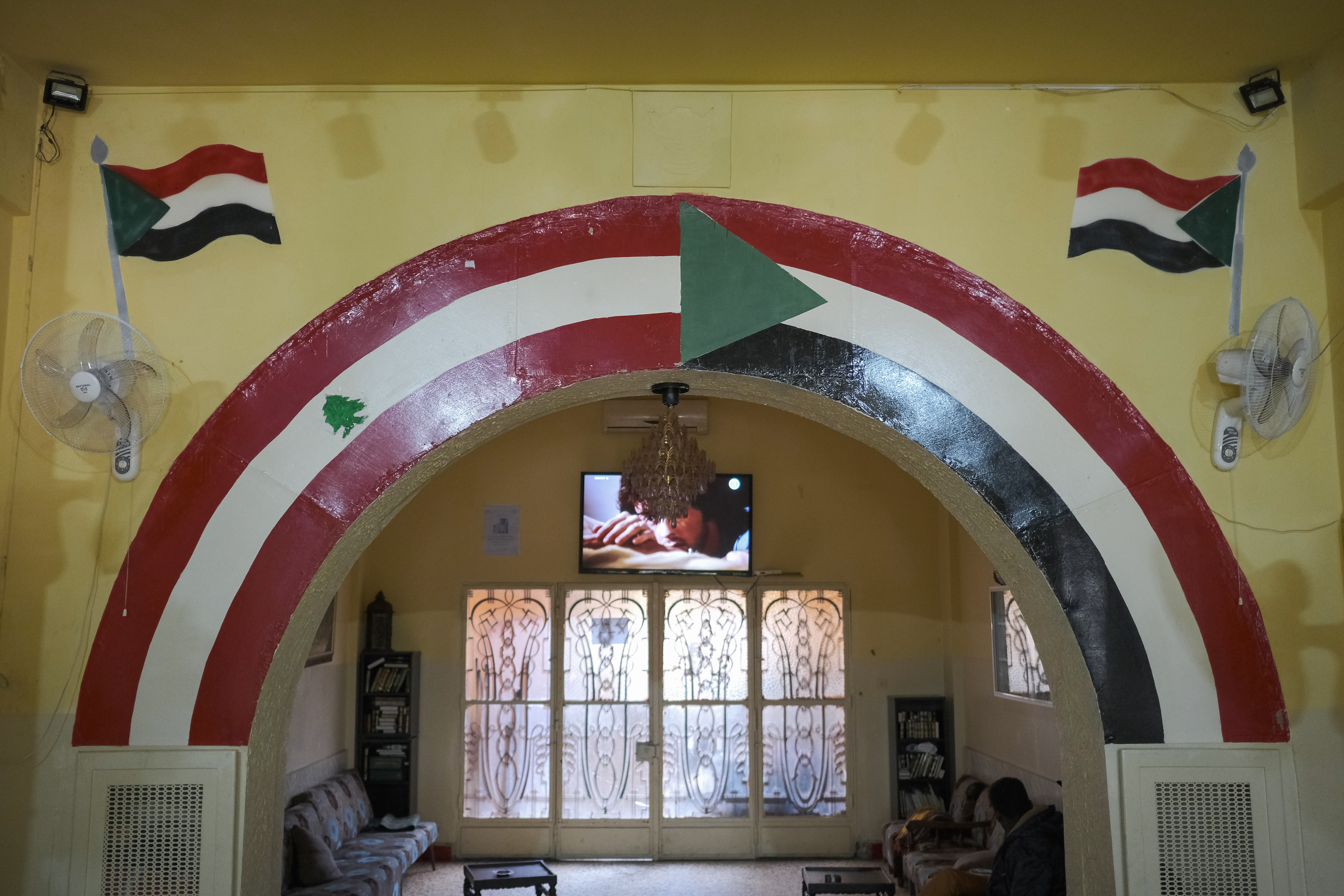 A Lebanese flag and a Sudanese flag adorn the wall inside the Sudanese Club’s main salon. May 7, 2023. (Credit: João Sousa/L’Orient Today)
A Lebanese flag and a Sudanese flag adorn the wall inside the Sudanese Club’s main salon. May 7, 2023. (Credit: João Sousa/L’Orient Today)
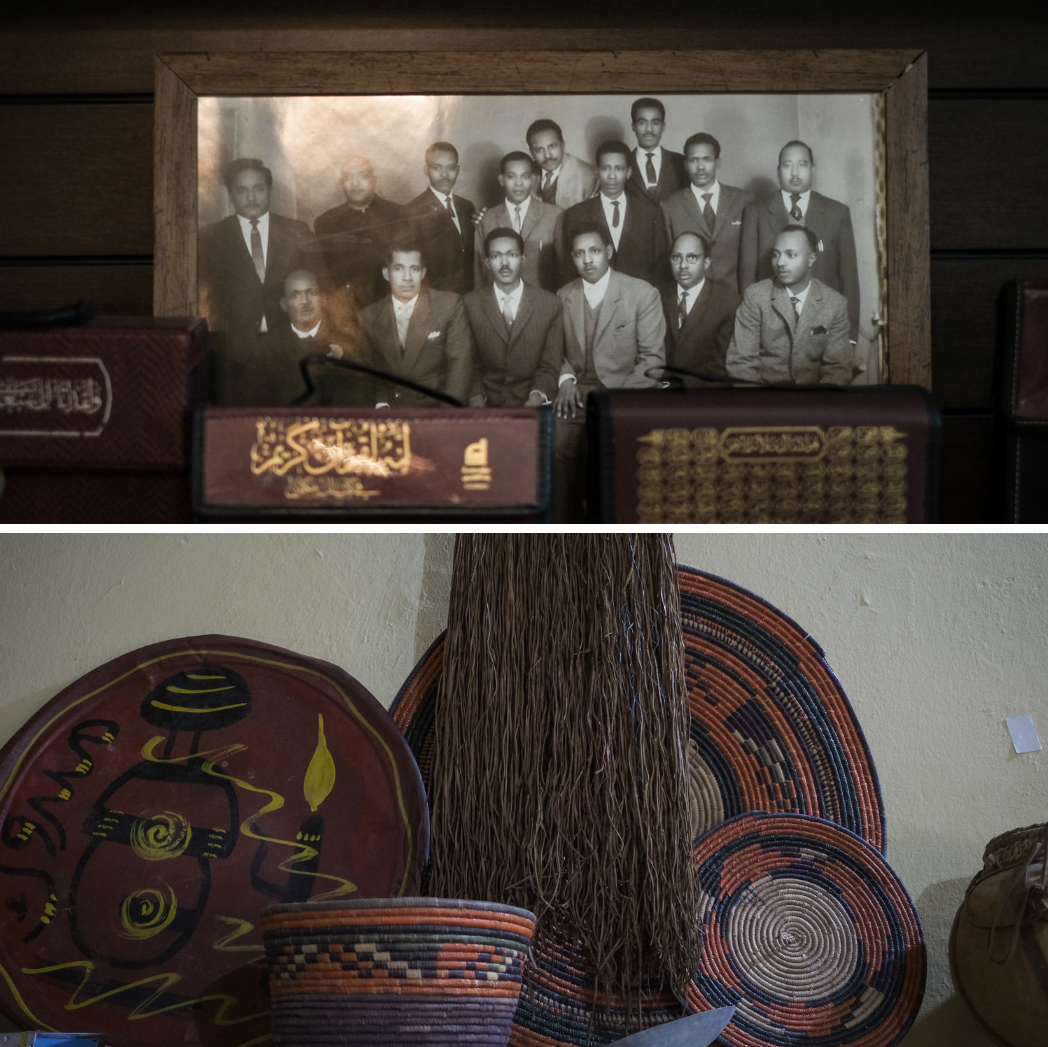 (Top) A photo in the Sudanese Club in Beirut’s Hamra neighborhood shows a group of founding members in the late 1960s. (Bottom) Sudanese artifacts on display in the Sudanese Club. May 7, 2023. (Credit: João Sousa/L’Orient Today)
(Top) A photo in the Sudanese Club in Beirut’s Hamra neighborhood shows a group of founding members in the late 1960s. (Bottom) Sudanese artifacts on display in the Sudanese Club. May 7, 2023. (Credit: João Sousa/L’Orient Today)
In happier times, they’d be here for Ramadan iftar meals, wedding parties perfumed by red Sudanese-style incense pots or simply to watch TV and hang out. Today, though “everyone is following the war, and they’re a bit sad,” says Said, the club administrator. “You can’t really hold joyful events right now.”
There’s still a trace of those older times in the backroom, where a dozen or so men gather to play cards and dominos. The dominos table is the loudest, with men slamming their pieces down on the table and talking smack between laughter. A quieter, older player with a grey mustache finally wins the match.
“Those two always lose!” laughs Abu Hussein, the winner, pointing to his neighbors. One of them, a heavy-set guy in a Biggie Smalls shirt, seems especially enthused about the playful banter.
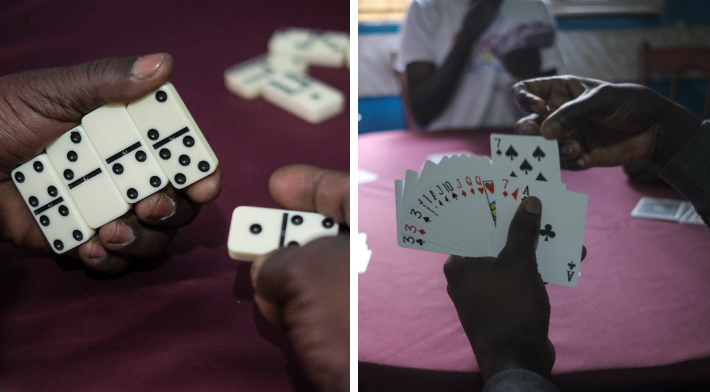 Men gather to play dominos and cards at the Sudanese Club in Beirut. May 7, 2023. (Credit: João Sousa/L’Orient Today)
Men gather to play dominos and cards at the Sudanese Club in Beirut. May 7, 2023. (Credit: João Sousa/L’Orient Today)
In the afterglow, Abu Hussein says he came to the club today to “hear the latest developments” on Sudan and see his friends. “I just want news.”
Whatever information does come through isn’t usually good. Many of the guys have lost loved ones to the war, and managed to hear about the deaths through intermittent phone connection.
They don’t have space in their tiny Beirut apartments for proper azaa gatherings to honor the dead and pay respects to the survivors. They also don’t have the money to buy food and drinks for guests to attend, says Bakr, a young worker who goes to the club.
Instead, they simply hold no azaas at all.
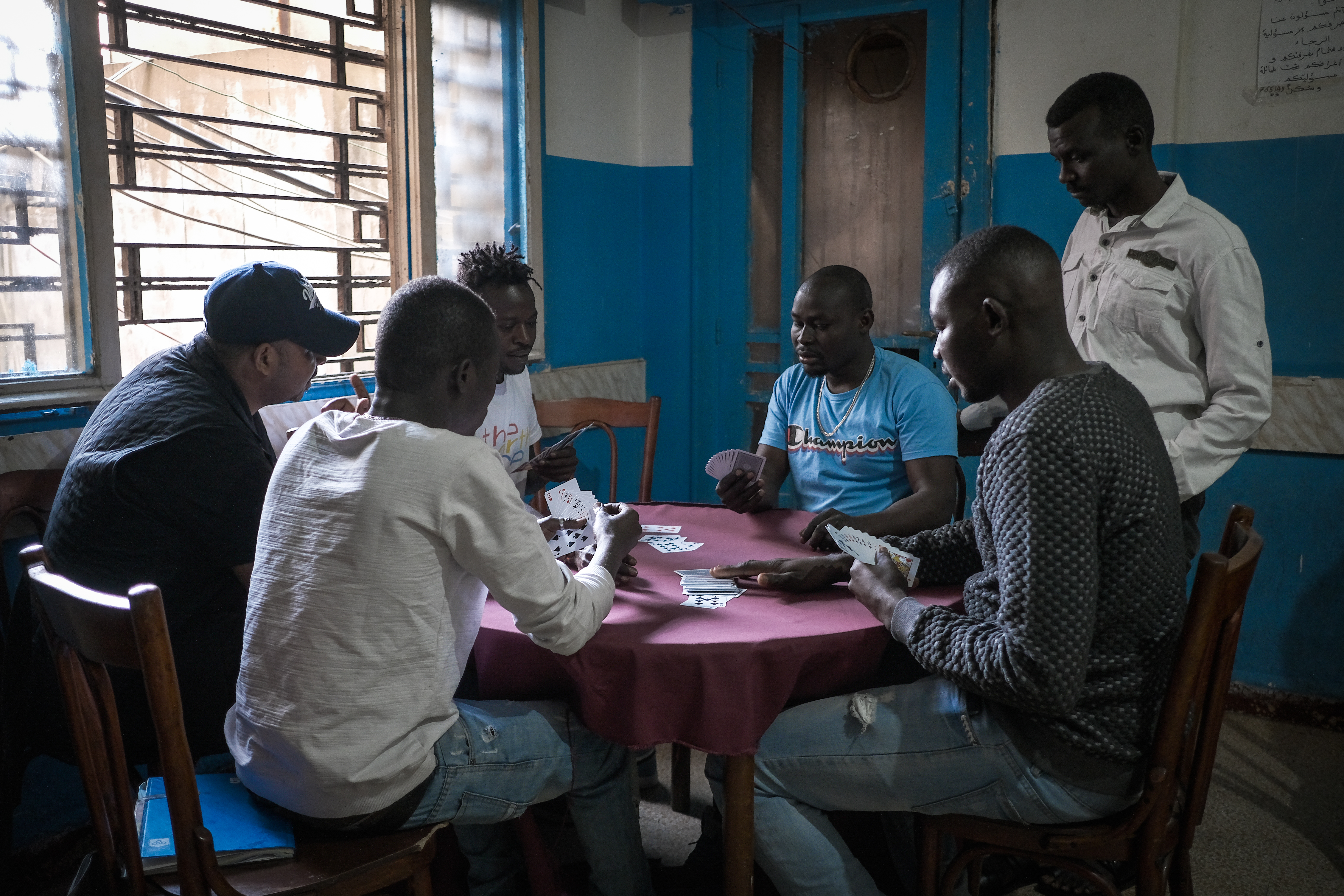 Men gather to play cards at the Sudanese Club in Beirut. May 7, 2023. (Credit: João Sousa/L’Orient Today)
Men gather to play cards at the Sudanese Club in Beirut. May 7, 2023. (Credit: João Sousa/L’Orient Today)
He can’t give an exact estimate of how many Sudanese here have lost loved ones back home to the war, and knows only that his own family have fled for safety.
But what he has gathered through the spotty mobile connection is that, in Sudan, “there have been too many azaa gatherings to count.”
*L’Orient Today has omitted the last names of workers quoted in this report to protect their identities.